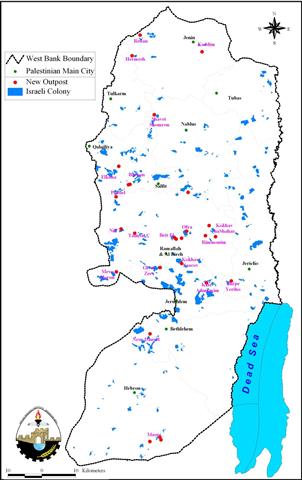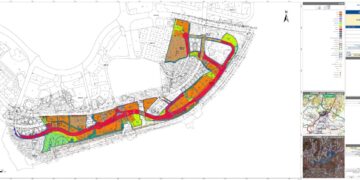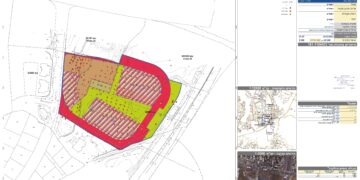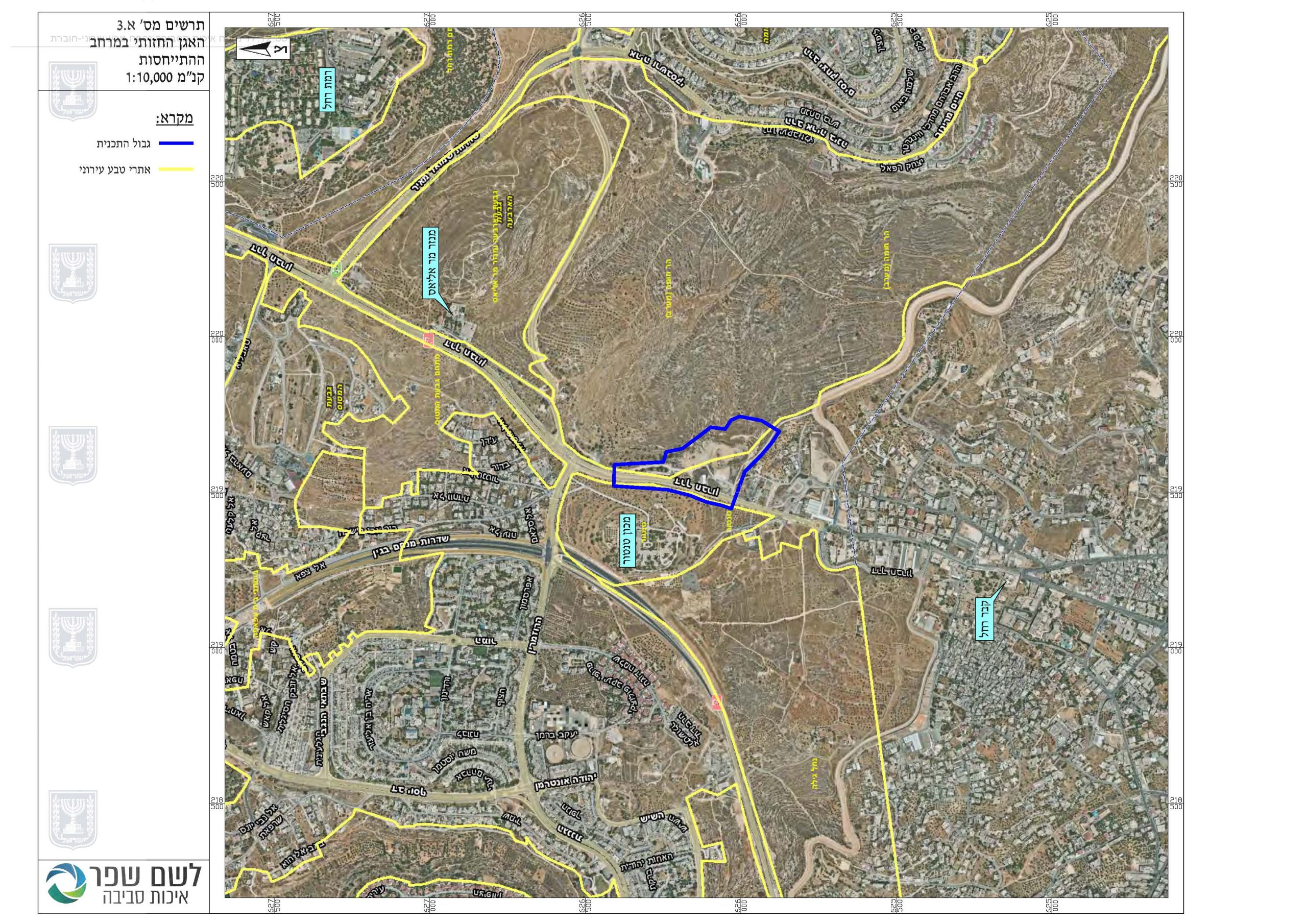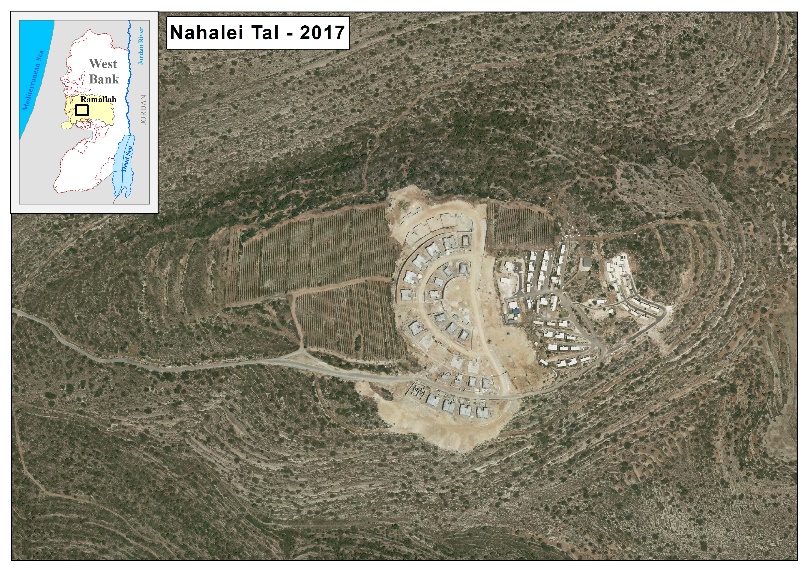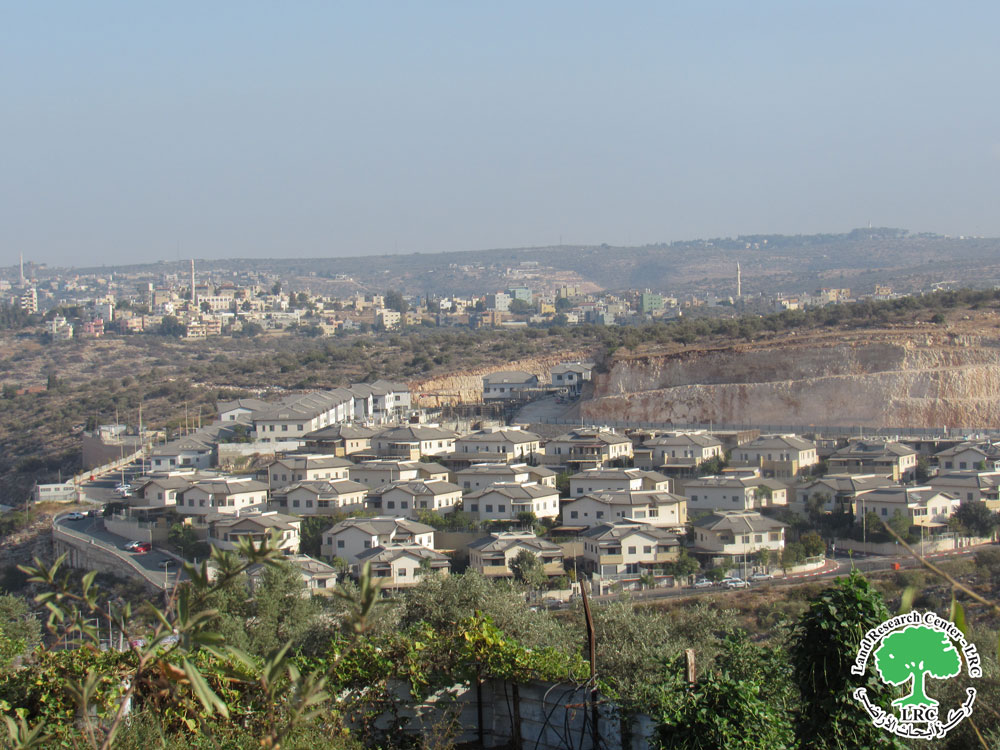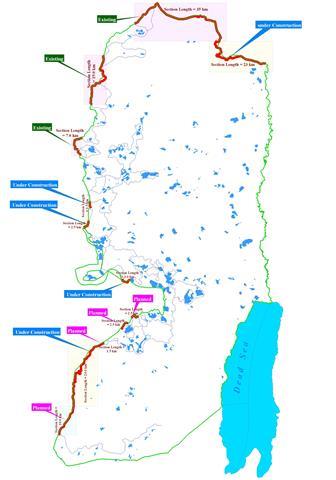The Israeli Government is continuing its illegal construction of Israeli settlement outposts inside the Occupied Palestinian Territories (OPT). The outposts, like other Israeli settlements in the OPT, are violation of international law including the Fourth Geneva Convention of 1949, Article 49 which states: ' The occupying power shall not deport or transfer parts of its own population into the territories it occupies.' The new outpost settlements are also a violation of the 'Road map' peace plan which calls for the dismantling of all indiscriminate Israeli outposts erected since March 2001 and the complete freeze of all settlements activity in the OPT.
The Israeli outpost settlements stand as a major impediment to peace between Palestinians and Israelis. The outposts represent a present and sustained attack on Palestinian land and identity. By appropriating more Palestinian land for Israeli settlement, the settlements and their outposts reduce the territorial area available for a future Palestinian state and expand Israeli control over larger sections of occupied Palestinian land.
Geographic Analysis of Illegal Israeli Outpost Settlements:
A recent Spot Image Analysis conducted by the GIS (Geographical Information System) Unit at the Applied Research Institute-Jerusalem (ARIJ) clearly shows that 27 new outpost settlements are under currently construction and expanding into additional tracts of Palestinian land. The 27 new outposts were all erected during the period of January 2004 to August 2004 and are scattered throughout the West Bank (see Table One).
|
Table 1: Distribution of Israeli outposts in West Bank Governorates |
||
|
Governorate |
# of Outposts |
Total of Caravans |
|
Ramallah |
12 |
60 |
|
Bethlehem |
1 |
3 |
|
Nablus |
1 |
2 |
|
Jenin |
3 |
21 |
|
Qalqilyia |
0 |
0 |
|
Hebron |
3 |
10 |
|
Tubas |
0 |
0 |
|
Salfit |
3 |
3 |
|
Jerusalem |
3 |
5 |
|
Tulkarem |
0 |
0 |
|
Jericho |
1 |
3 |
|
Total |
27 |
102 |
Source: Applied Research Institute â??Jerusalem
December 2004
Although the Road Map peace plan calls for the immediate dismantling of all settlement outposts, Israel continues to use the outposts to further its colonization of the Palestinian territories. The new settlement outposts are used to pave the way for the expansion of existing Israeli settlements by establishing an Israeli presence in the area and reinforcing Israeli territorial authority over surrounding Palestinian lands. The outposts serve as pioneer settlements which often become incorporated into the already established Israeli settlements nearby.
Most new Israeli outposts erected during the aforementioned period are concentrated in the central part of the West Bank, mainly in Ramallah Governorate where 12 settlement outposts were erected containing 60 new caravans (see Table One). Table Two and Map 1 detail the location of each outpost in West Bank Governorates in addition to the number of caravans included within each outpost:
|
Table 2: Location of settlement outposts in West Bank Governorates |
|||
|
Name |
Mother Settlement |
# of caravans |
Governorate |
|
Neve Danyel |
3 |
Bethlehem |
|
|
Ma'on |
7 |
Hebron |
|
|
Maon (military Tower) |
Ma'on |
0 |
Hebron |
|
Ma'on ( south ) |
Ma'on |
3 |
Hebron |
|
Rehan |
1 |
Jenin |
|
|
Kadim |
9 |
Jenin |
|
|
Hermish |
11 |
Jenin |
|
|
East Mizpe Yeriho |
Mizpe Yeriho |
3 |
Jericho |
|
Kfar Adumim |
2 |
Jerusalem |
|
|
Kokhav Yaacov |
2 |
Jerusalem |
|
|
Givat Zeev |
1 |
Jerusalem |
|
|
Shavei Shomron |
2 |
Nablus |
|
|
Talmon C |
1 |
Ramallah |
|
|
South Peduel |
Peduel |
1 |
Ramallah |
|
Kokhav Hashahar |
2 |
Ramallah |
|
|
Rimmonim |
6 |
Ramallah |
|
|
Southeast Koshahar construction (military outpost) |
Koshahar |
0 |
Ramallah |
|
Ofra |
10 |
Ramallah |
|
|
South Ofra |
Ofra |
1 |
Ramallah |
|
Beit El |
1 |
Ramallah |
|
|
East Beit El |
Beit El |
18 |
Ramallah |
|
Mevo Horon |
8 |
Ramallah |
|
|
East Eli |
Eli |
10 |
Ramallah |
|
North Naaleh |
Naaleh |
2 |
Ramallah |
|
Northwest Niriyya |
Niriyya |
0 |
Salfit |
|
west _ Arial industrial Park |
Arial Industrial Park |
1 |
Salfit |
|
East_Arial west park industrial |
Arial Industrial Park |
2 |
Salfit |
|
Total |
|
107 |
|
Map One: new Israeli Outpost (January – August) 2004
Of all West Bank areas, Ramallah Governorate has been the most affected by the erection of Israeli outpost settlements. The outposts are situated so as to hem in the Governorate on all sides. This highly strategic configuration is aided by the fact that the outposts were erected in the vicinity of already established Israeli settlements which surround Ramallah and its neighboring villages. The established settlements are: Naaleh, Ofra, Peduel, Talmon C, Beit El, Rimmonim, Kokhav Hashahar, Mevo Horon and Eli (See Map One). The expansion of the outpost settlements has re-enforced the contiguity between the outposts and the mother settlements nearby. As a result, the formation and development of the outpost settlements contributes to the expansion of the territory illegally annexed to Israeli settlements.
The Jenin Governorate includes three outposts with 21 caravans. The outposts are near the illegal Israeli settlements of Kadim, Hermesh and Rehan, respectively. The Hebron Governorate includes three outposts with 10 caravans, all of them near the illegal Israeli settlement of Ma'on. In the Jerusalem Governorate, the focus is on the illegal Israeli settlements of Kfar Adummim, Mizpe Yeriho and Kokhav Yaacov where Israeli settlers have erected three outpost settlements containing a total of 5 caravans.
Israeli Settlements and International Law:
The Israeli Government's construction of settlement outposts in the Occupied Palestinian Territories violates numerous statutes of international humanitarian law, including:
-
The Fourth Geneva Convention of 1949, Article 49, and paragraph 6 of which states: 'The occupying power shall not deport or transfer parts of its own population into the territories it occupies.' Article 53 of the Convention also prohibits 'any destruction by the Occupying Power of real or personal property belonging individually or collectively to private persons, or to the State, or to other public authorities, or to social or cooperative organizations, is prohibited, except where such destruction is rendered absolutely necessary by military operations.'
-
The Hague Regulations of 1907, Article 23 of which prohibits the destruction or seizure of occupied property, unless it is imperatively demanded by military necessity.
-
United Nations Security Council Resolution 242 (1967) which requires Israeli armed forces to withdraw from 'the territories occupied' in the 1967 war, including the West Bank and Gaza Strip.
-
United Nations Security Council Resolution 452 (1979) which calls upon 'the Government and people of Israel to cease, on an urgent basis, the establishment, construction and planning of settlements in the Arab territories occupied since 1967, including Jerusalem.'
-
United Nations Security Council Resolution 465 (1980) which 'Determines that all measures taken by Israel to change the physical character, demographic composition, institutional structure of status of the Palestinian and other Arab territories occupied since 1967, including Jerusalem, or any part thereof, have no legal validity and that Israel's policy and practices of setting parts of its population and new Immigrants in those territories constitute a flagrant violation of the fourth Geneva convention relative to the protection of civilian persons in time of war and also constitute a serious obstruction to achieving a comprehensive, just and lasting peace in the Middle East.'
Conclusion:
An ARIJ Report published in 2004 found that Israeli occupation authorities illegally erected nine new Israeli settlements and 65 new outposts in the Palestinian Territories between 2002 and 2004. Israel is now pressing forward with the expansion of these new settlements, illegally appropriating and developing large portions of Palestinian land in the process. The expansion of illegal Israeli settlements and settlement outposts is a violation of international law and the terms of the Road Map peace plan. Israeli occupation authorities, however, have ignored every law and agreement that forcibly prohibits Israel from continuing settlement activities.
Related Articles:
-
The Obstacles to Peace Just Got Bigger !!! Why Puff up the Israeli Settlements Now ? , August 18, 2004.
-
24 new settlements and 113 new outposts in the west Bank , October 2002.
Prepared by:
The Applied Research Institute – Jerusalem


